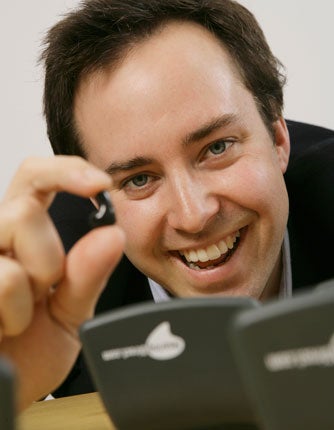Spotting a niche in the market
The essence of entrepreneurship is in providing a service no-one else does, says Jamie Murray Wells

Your support helps us to tell the story
From reproductive rights to climate change to Big Tech, The Independent is on the ground when the story is developing. Whether it's investigating the financials of Elon Musk's pro-Trump PAC or producing our latest documentary, 'The A Word', which shines a light on the American women fighting for reproductive rights, we know how important it is to parse out the facts from the messaging.
At such a critical moment in US history, we need reporters on the ground. Your donation allows us to keep sending journalists to speak to both sides of the story.
The Independent is trusted by Americans across the entire political spectrum. And unlike many other quality news outlets, we choose not to lock Americans out of our reporting and analysis with paywalls. We believe quality journalism should be available to everyone, paid for by those who can afford it.
Your support makes all the difference.I believe that anyone can be an entrepreneur – it’s just about finding that gap in the market and knowing how to fill it. From a young age I would make batches of home-made jam, wash cars or make t-shirts in various money-making schemes, and very often the best business ideas come from instinct.
I came up with the idea for my first company, Glasses Direct, offering cut-price prescription glasses over the internet, while studying at the University of West England – when I needed a pair of glasses. I couldn’t afford a pair from a high street shop and realised I could save money by contacting the manufacturers’ directly with my prescription. This formed the basis of my business and today the company sells a pair every few minutes. Entrepreneurs have to trust their instinct and listen to the problems/opportunities they encounter in day to day life.
The idea for my second business venture came from the fact that I was born deaf in one ear. Although the hearing in my ‘good ear’ is spot on, I started researching hearing aids in case it deteriorates, and was shocked to see that hearing aids cost an average of £1,100 on the high street. I realised that if glasses could be bought from manufacturers and sold directly to customers online at far lower prices, the same rules could be applied to hearing aids.
Hearing aids might not be the most fashionable niche but they make a huge difference to a lot of people, particularly in terms of confidence and independence. Just because a product isn’t particularly ‘sexy’, it doesn’t mean that the business opportunity should be overlooked. In fact, some of the best opportunities out there are the forgotten ones – the ones entrepreneurs and investors haven’t got round to addressing, perhaps precisely because they’re not sexy.
My experience also proves that your niche in the market doesn’t necessarily have to be a ground-breaking new gadget using the latest technology, but can instead be a twist in your approach, such as changing the way in which people access the product or service, or a different business model than hasn’t been traditionally used.
To me it seemed obvious to create a disruptive model which would keep costs down and fit in with growing consumer experience and confidence in the internet. By being online, the business is effectively open 24 hours a day, seven days a week and running costs are further reduced thanks to not needing a high street shop and forking out associated costs like rent, heating and so on.
Once you’ve identified a gap in the market, it’s essential to work out how to fill it in the best way possible – get expert advice if necessary. Although I knew that there was a demand for hearing aids at fair prices, the first hurdle for me was how to identify whether or not a person needs a hearing aid, through the internet. At this point I brought in an audiologist who developed a quick and easy hearing check for customers to complete through their laptop or PC, so they could find out if they could benefit from a hearing aid.
Once you’ve had your eureka moment, tell people about it. Don’t keep it a secret. Find the best, most experienced people you can lay your hands on, and don’t be afraid to ask their advice. One of the things that surprised me about being an entrepreneur is the amount of people who are willing to give advice. People love it and now that I mentor others, I understand how satisfying it is to help others get started.
My other piece of advice is to research, research, research. With HearingDirect.com, I extensively researched the market and found that there are an estimated 8.2 million people in the UK with mild to moderate hearing loss, and realised that many people would be unwilling or unable to pay the high prices for hearing aids quoted by high street stores. A chance meeting with two hearing aid experts with 20 years experience of the industry between them confirmed my findings, and we teamed up to launch the company in January 2010. Glasses Direct and Hearing Direct are now market leaders online.
Jamie Murray Wells is chairman of Hearing Direct and Glasses Direct
Join our commenting forum
Join thought-provoking conversations, follow other Independent readers and see their replies
Comments